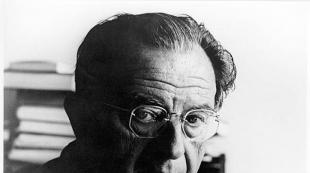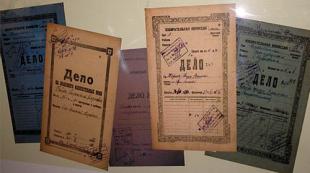The genre of Leskov's work is Lady Macbeth of the Mtsensk district. Analysis of the work "Lady Macbeth of the Mtsensk District" (N. S. Leskov). title accent
Nikolay Leskov
Lady Macbeth Mtsensk district
"Blushing to sing the first song."
Proverb
Chapter first
Sometimes in our places such characters are set that no matter how many years have passed since meeting with them, some of them will never be remembered without spiritual trepidation. Among these characters is the merchant's wife Katerina Lvovna Izmailova, who played out a once terrible drama, after which our nobles, from someone's easy word, began to call her Lady Macbeth of the Mtsensk district.
Katerina Lvovna was not born a beauty, but she was a very pleasant woman in appearance. She was only twenty-four years of age; She was short, but slender, with a neck as if carved from marble, round shoulders, a strong chest, a straight, thin nose, black, lively eyes, a high white forehead and black, almost blue-black hair. They gave her in marriage to our merchant Izmailov with Tuskari from the Kursk province, not out of love or any attraction, but because Izmailov was courting her, and she was a poor girl, and she did not have to sort out suitors. The Izmailovs' house was not the last in our city: they traded grain, kept a large mill in the district for rent, had a profitable garden near the city and a good house in the city. In general, the merchants were wealthy. Moreover, their family was quite small: father-in-law Boris Timofeevich Izmailov, a man already in his eighties, had long been a widow; his son Zinovy Borisych, the husband of Katerina Lvovna, a man also in his fifties, and Katerina Lvovna herself, and nothing more. Katerina Lvovna had no children for the fifth year since she married Zinovy Borisych. Zinovy Borisych had no children even from his first wife, with whom he lived for twenty years before he was widowed and married Katerina Lvovna. He thought and hoped that God would give him, even from his second marriage, an heir to the merchant's name and capital; but again he had no luck in this and with Katerina Lvovna.
This childlessness distressed Zinovy Borisych very much, and not only Zinovy Borisych alone, but old Boris Timofeyitch, and even Katerina Lvovna herself, was very sad. Since the exorbitant boredom in the locked merchant’s chamber with a high fence and lowered chain dogs more than once made the young merchant’s wife feel melancholy, reaching the point of stupor, and she would be glad, God knows how glad she would be to babysit the little girl; and the other - and she was tired of reproaches: “What did she go for and why did she get married; why did she bind a man’s fate, nerd, ”as if in fact she had committed a crime against her husband, and before her father-in-law, and before all their honest merchant family.
With all the contentment and kindness, Katerina Lvovna's life in her mother-in-law's house was the most boring. She did not go to visit much, and even then, if she and her husband go along with her merchant class, it will not be a joy either. The people are all strict: they watch how she sits down, but how she passes, how she gets up; and Katerina Lvovna had an ardent character, and, living as a girl in poverty, she got used to simplicity and freedom: she would run with buckets to the river and swim in a shirt under the pier, or sprinkle sunflower husks through the gate of a passer-by; but here everything is different. The father-in-law and her husband would get up early, drink tea at six o'clock in the morning, and go about their business, and she alone wanders the elephants from room to room. Everywhere is clean, everywhere is quiet and empty, the lamps are shining in front of the images, and nowhere in the house is there a living sound, not a human voice.
Like, like, Katerina Lvovna walks through the empty rooms, begins to yawn out of boredom and climbs the stairs to her matrimonial bedchamber, arranged on a high small mezzanine. Here, too, she will sit, stare, as they hang hemp or grains at the barns, pour them out - she will yawn again, she is glad: she will take a nap for an hour or two, and wake up - again the same Russian boredom, the boredom of a merchant's house, from which it is fun, they say, even strangle yourself. Katerina Lvovna was not a huntress to read, and besides, there were no books in the house, except for the Kyiv patericon.
Katerina Lvovna lived a boring life in a rich mother-in-law's house for five whole years of her life with an unkind husband; but no one, as usual, paid her the slightest attention to this boredom.
Chapter Two
On the sixth spring of Katerina Lvovna's marriage, the mill dam broke through at the Izmailovs. At that time, as if on purpose, a lot of work was brought to the mill, and a huge gap arose: the water went under the lower bed of the idle cover, and it was not possible to capture it with a quick hand. Zinovy Borisych drove the people to the mill from the whole district, and he himself sat there incessantly; the affairs of the city were already managed by one old man, and Katerina Lvovna toiled at home for whole days all alone. At first she was even more bored without her husband, but then it even seemed better: she became freer alone. Her heart for him had never been especially laid, and without him at least one commander over her was less.
Once Katerina Lvovna was sitting on the tower under her little window, yawning and yawning, thinking of nothing in particular, and she finally began to yawn ashamed. And the weather outside is so wonderful: warm, light, cheerful, and through the green wooden lattice of the garden you can see how different birds fly from knot to knot through the trees.
“What am I really yawning? thought Katerina Lvovna. “Sam-well, at least I’ll get up in the yard and take a walk or go into the garden.”
Katerina Lvovna threw on an old damask coat and went out.
Out in the yard one breathes so brightly and strongly, and in the gallery by the barns there is such cheerful laughter.
- What are you so happy about? Katerina Lvovna asked her father-in-law clerks.
“But, mother Katerina Ilvovna, they hanged a live pig,” the old clerk answered her.
- What pig?
“But the pig Aksinya, who gave birth to a son, Vasily, didn’t invite us to the christening,” the young man said boldly and cheerfully with a bold, beautiful face framed by jet-black curls and a barely breaking beard.
At that moment, the fat mug of Aksinya, a ruddy-faced cook, peeped out of the flour caddy, which was hung on a weighted yoke.
“Damn, smooth devils,” the cook cursed, trying to grab hold of the iron yoke and get out of the swinging cady.
“It pulls eight pounds before dinner, and the fir will eat hay, and the weights will be missing,” the handsome fellow explained again and, turning the cad, threw the cook onto a sack folded in the corner.
Baba, jokingly cursing, began to recover.
- Well, how much will I have? - Katerina Lvovna joked and, holding the ropes, stood on the board.
“Three poods, seven pounds,” answered the same handsome fellow Sergei, throwing a weight on the weight bench. - Curiosity!
– Why are you surprised?
- Yes, three pounds in you pulled, Katerina Ilvovna. You, I argue, must be carried all day in your arms - and then you won’t get tired, but only for pleasure you will feel it for yourself.
- Well, I'm not a man, or what? I suppose you’ll get tired too, ”said Katerina Lvovna, blushing slightly, weaned from such speeches, feeling a sudden surge of desire to talk and talk a lot of cheerful and playful words.
- Oh my God! I would bring it to Arabia happy, ”Sergey answered her to her remark.
“That’s not how you, well done, argue,” said the man who was sleeping. - What is this heaviness in us? Does our body pull? our body, dear man, means nothing in weight: our strength, strength pulls - not the body!
“Yes, I had a strong passion in girls,” said Katerina Lvovna, again unable to bear it. - Even a man did not overcome me.
“Come on, let me have a pen, if it’s true,” asked the handsome fellow.
Katerina Lvovna was embarrassed, but held out her hand.
- Oh, let the ring go: it hurts! cried Katerina Lvovna, when Sergei squeezed her hand in his hand, and with her free hand pushed him in the chest.
The good fellow released his mistress's hand and from her push flew off two steps to the side.
"Blushing to sing the first song."
Proverb.
Chapter first
Sometimes in our places such characters are set that, no matter how many years have passed since meeting with them, some of them will never be remembered without spiritual trepidation. Among these characters is the merchant's wife Katerina Lvovna Izmailova, who played a once terrible drama, after which our nobles, from someone's easy word, began to call her Lady Macbeth of the Mtsensk district. Katerina Lvovna was not born a beauty, but she was a very pleasant woman in appearance. She was only twenty-four years of age; She was short, but slender, with a neck as if carved from marble, round shoulders, a strong chest, a straight, thin nose, black, lively eyes, a high white forehead and black, almost blue-black hair. They gave her in marriage to our merchant Izmailov with Tuskari from the Kursk province, not out of love or any attraction, but because Izmailov was courting her, and she was a poor girl, and she did not have to sort out suitors. The Izmailovs' house was not the last in our city: they traded grain, kept a large mill in the district for rent, had a profitable garden near the city and a good house in the city. In general, the merchants were wealthy. Moreover, their family was quite small: father-in-law Boris Timofeevich Izmailov, a man already in his eighties, had long been a widow; his son Zinovy Borisych, the husband of Katerina Lvovna, a man also in his fifties, and Katerina Lvovna herself, and nothing more. Katerina Lvovna had no children for the fifth year since she married Zinovy Borisych. Zinovy Borisych had no children even from his first wife, with whom he lived for twenty years before he was widowed and married Katerina Lvovna. He thought and hoped that God would give him, even from his second marriage, an heir to the merchant's name and capital; but again he had no luck in this and with Katerina Lvovna. This childlessness distressed Zinovy Borisych very much, and not only Zinovy Borisych alone, but old Boris Timofeyitch, and even Katerina Lvovna herself, was very sad. Since the exorbitant boredom in the locked merchant’s chamber with a high fence and lowered chain dogs more than once made the young merchant’s wife feel melancholy, reaching the point of stupor, and she would be glad, God knows how glad she would be to babysit the little girl; and the other and reproaches bothered her: “What did she go for and why did she get married; why did she bind a man’s fate, non-native mother, ”as if in fact she had committed a crime against her husband, and before her father-in-law, and before all their honest merchant family. With all the contentment and kindness, Katerina Lvovna's life in her mother-in-law's house was the most boring. She did not go to visit much, and even then, if she and her husband go along with her merchant class, it will not be a joy either. The people are all strict: they watch how she sits down, but how she passes, how she gets up; and Katerina Lvovna had an ardent character, and, living as a girl in poverty, she got used to simplicity and freedom: she would run with buckets to the river and swim in a shirt under the pier, or sprinkle sunflower husks through the gate of a passer-by; but here everything is different. The father-in-law and her husband would get up early, drink tea at six o'clock in the morning, and go about their business, and she alone wanders the elephants from room to room. Everywhere is clean, everywhere is quiet and empty, the lamps are shining in front of the images, and nowhere in the house is there a living sound, not a human voice. Like, like, Katerina Lvovna walks through the empty rooms, begins to yawn out of boredom and climbs the stairs to her matrimonial bedchamber, arranged on a high small mezzanine. Here, too, she will sit, stare, how they hang hemp or pour grits at the barns, she will yawn again, she is glad: she will take a nap for an hour or two, and wake up again the same Russian boredom, the boredom of a merchant's house, from which it is fun, they say, even hang yourself . Katerina Lvovna was not a huntress to read, and besides, there were no books in the house, except for the Kyiv patericon. Katerina Lvovna lived a boring life in a rich mother-in-law's house for five whole years of her life with an unkind husband; but no one, as usual, paid her the slightest attention to this boredom.Katerina Lvovna, “a very pleasant woman in appearance,” lives in the wealthy house of the merchant Izmailov with her widowed father-in-law Boris Timofeevich and her elderly husband Zinovy Borisovich. Katerina Lvovna has no children, and "with all the contentment" her life "for an unkind husband" is the most boring. In the sixth year of marriage
Zinovy Borisovich leaves for the mill dam, leaving Katerina Lvovna "all alone." In the courtyard of her house, she measures strength with the impudent worker Sergei, and from the cook Aksinya she learns that this fellow has been serving with the Izmailovs for a month, and was expelled from the former house for "love" with the mistress. In the evening, Sergei comes to Katerina Lvovna, complains of boredom, says that he loves, and stays until morning. But one night, Boris Timofeevich notices how Sergei's red shirt descends from his daughter-in-law's window. The father-in-law threatens that he will tell Katerina Lvovna's husband everything, and send Sergei to prison. That very night, Katerina Lvovna poisons her father-in-law with a white powder reserved for rats, and continues her "aligoria" with Sergei.
Meanwhile, Sergei becomes dry with Katerina Lvovna, is jealous of her husband and talks about his insignificant state, confessing that he would like to be her husband “before the holy pre-eternal temple”. In response, Katerina Lvovna promises to make him a merchant. Zinovy Borisovich returns home and accuses Katerina Lvovna of "cupids". Katerina Lvovna takes Sergei out and boldly kisses him in front of her husband. Lovers kill Zinovy Borisovich, and the corpse is buried in the cellar. Zinovy Borisovich is searched uselessly, and Katerina Lvovna "does well with Sergei, as a widow at liberty."
Soon Zinovy Borisovich's young nephew Fyodor Lyapin comes to live with Izmailova, whose money the late merchant had in circulation. Urged on by Sergei, Katerina Lvovna plans to kill the God-fearing boy. On the night of Vespers on the feast of the Introduction, the boy remains in the house alone with his lovers and reads the Life of St. Theodore Stratilates. Sergei grabs Fedya, and Katerina Lvovna smothers him with a feather pillow. But as soon as the boy dies, the house begins to shake from the blows, Sergei panics, sees the late Zinovy Borisovich, and only Katerina Lvovna understands that it is the people who see through the crack that is being done in the “sinful house”.
Sergei is taken to the unit, and at the first words of the priest about the Last Judgment, he confesses to the murder of Zinovy Borisovich and calls Katerina Lvovna an accomplice. Katerina Lvovna denies everything, but at the confrontation she admits that she killed "for Sergei." Murderers are punished with whips and sentenced to hard labor. Sergei arouses sympathy, but Katerina Lvovna behaves steadfastly and refuses to even look at her newborn child. He, the only heir of the merchant, is given up for education. Katerina Lvovna thinks only of how to get to the stage as soon as possible and see Sergei. But at the stage, Sergei is unkind and secret dates do not please him. At Nizhny Novgorod, the Moscow party joins the prisoners, with which the soldier Fiona of a free temper and the seventeen-year-old Sonetka go, about whom they say: “it curls around the hands, but is not given in the hands.”
Katerina Lvovna arranges another date with her lover, but finds the trouble-free Fiona in his arms and quarrels with Sergei. Having never reconciled with Katerina Lvovna, Sergei begins to “cheap” and flirt with Sonetka, who seems to be “handling”. Katerina Lvovna decides to leave her pride and put up with Sergei, and during the meeting, Sergei complains of pain in his legs, and Katerina Lvovna gives him thick woolen stockings. The next day, she notices these stockings on Sonetka and spits in Sergei's eyes. At night, Sergei, together with a friend, beats Katerina Lvovna to the giggle of Sonetka. Katerina Lvovna cries out grief on Fiona's chest, the whole party, led by Sergei, mocks her, but Katerina Lvovna behaves with "wooden calmness". And when the party is transported by ferry to the other side of the river, Katerina Lvovna grabs Sonetka by the legs, throws herself overboard with her, and both drown.
This work. Speaking about the history of writing the story, we note that it is known from Leskov’s biography that the author himself was involved in judicial criminal cases, and this suggests that the story of “Lady Macbeth” could well be based on real events, because we are talking about crimes and concepts of morality. The work was written in 1864.
Genre, composition and main theme
Although this article has already noted that the work is a story, Nikolai Leskov himself defined the genre as an essay, since it contains elements of narration of real events and has its own background. Therefore, it would not be a mistake to call the genre of the work both an essay and a story.
Since in any classical work there is a certain problem, when making an analysis of "Lady Macbeth of the Mtsensk District", we also do not miss the mention of the problems raised by the author. And the main one is the moral problem, which the heroes of the work do not talk about, but this topic is clearly expressed if you follow the ongoing events and dialogues. The analysis is provided to readers, because everyone can have their own understanding of morality, but there are certain standards, to deviate from which means to act immorally.
Another problem is the manifestation of love, or rather, the consideration of what a hot woman is capable of. loving woman. What is the main theme of the piece?
Of course, this is the theme of love. Intoxicated with feelings, but cold at the time of the crime, Katerina shows by her example what she is ready for for her own happiness. Though we can't call her happy after all she's done. That is why this is an essay - there is no assessment of the characters and characteristics of their personality, but only terrible crimes are described, which can be assessed from the outside.
Basic images
- Katerina. The main character of the essay. She was not beautiful in appearance, but she was an attractive woman, charismatic. Lonely, living without children and husband. From the description of her life, we understand that she is not a potential criminal. And she is ready to enter into a relationship with the first comer who will pay attention to her.
- Sergey. The clerk who did not love Katerina, but played with her and with her feelings.
- The father-in-law who mocked Sergei. He was later killed by Katerina.
- Fedya Lyamin. The son of the murdered husband, a little boy. It was his murder that prompted the heroine to think that it was difficult for her to stop killing.
Important details of the analysis of "Lady Macbeth of the Mtsensk District"
Of course, "Lady Macbeth" is a morally difficult work about the consequences of the love of an eternally lonely woman. Each murder is described in detail. Love was not a rush of feelings in the life of the main character, she was closed in herself and boring, she spent all the time at home and messed around. Katerina Lvovna understood that love is a certain characteristic of a person that everyone should have, including her. But then she did not realize what such reasoning would bring her to.
Sergei, being her accomplice, hiding the body of his father-in-law together, went to crimes for profit. But Katerina was obsessed, there was no stopping her. After this murder, she felt like the mistress of the house, gave orders to everyone, but at the same time, Sergei was always with her. For the sake of him and their love, she was ready for anything. Which she confirms by the fact that she follows his lead and does not dare to say a word against it.
When Fedya arrived at their house, Sergey became the initiator of the murder. He inspired the woman that the boy is an obstacle to their family happiness. In his opinion, the boy will destroy their union. The image of Fedya is one of the most significant in the essay "Lady Macbeth of the Mtsensk District", which we are analyzing. Together with the boy, Catherine's soul also dies. She decides on a brutal murder, even while pregnant.
Committing murder after murder, changes are noticed in the portrait of Sergei, such as trembling of the lips, tremor of the chin, and others, but Katerina remains completely soulless. But in the denouement of the essay, Katerina herself becomes a victim, and one even feels sorry for her. She no longer loves anyone, including herself.
The work caused a storm of condemnation and indignation. It did not fit the literary criteria and the political mood of the time. The image of Katerina was not recognized as a typical female Russian image.
In this article, we have presented you brief analysis story "Lady Macbeth of the Mtsensk District", you will find more information on the topic by visiting our literary
Leskov began writing "Lady Macbeth of the Mtsensk District" in the autumn of 1864, defining the genre of the work as an essay. The story was first published in January 1865 in the Epoch magazine under the title “Lady Macbeth of our county” as “the 1st number of a series of essays exclusively on typical female characters of our (Oka and part of the Volga) area”. The final name appeared when it was published in 1867 in the collection "Tales, Essays and Stories by M. Stebnitsky" after a significant stylistic revision of the magazine version. Leskov himself called his story a gloomy story, in strict tones, a sustained study of a strong and passionate female character. The story was supposed to be the beginning of a cycle about the characters of Russian women. “Lady Macbeth” was to be followed by “Graziella” (noblewoman), “Mayorsha Polivodova” (old-world landowner), “Fevronya Rokhovna” (peasant schismatic) and “Grandmother Flea” (midwife). However, the cycle was never written, apparently partly due to the fact that the Epoch magazine, where it was supposed to be published, soon closed.
The title contains an allusion to I. S. Turgenev's story "Hamlet of the Shchigrovsky district" (1849).
title accent
Despite the fact that the correct accent in the name of Shakespeare's character is Macbeth, in the title of Leskov's story, the stress traditionally falls on the first syllable for a number of reasons. First, in Leskov's time, Shakespeare's translations emphasized the first syllable:
Secondly, when Macbeth is stressed, the rhythm of the title is lost, which is impossible for Leskov with his commitment to the language game and syllabic-tonic metrization in his texts. The title in the first publication, "Lady Macbeth of Our County," with the same rhythm, also speaks in favor of the stress on the first syllable.
Plot
The main character is a young merchant's wife Katerina Lvovna Izmailova. Her husband is constantly at work, away. She is bored and lonely in the four walls of a big rich house. The husband is barren, but together with his father he reproaches his wife. Katerina falls in love with a young handsome clerk Sergei, gradually her passion turns into passion, the lovers spend the night together. She is ready for anything for her lover. A series of murders begins: first, Katerina Lvovna poisons her father-in-law in order to save Sergei, whom the father-in-law locked in the cellar, then, together with Sergei, she kills her husband, and then strangles her underage nephew Fedya with a pillow, who could challenge her rights to the inheritance. However, at that moment, a crowd of idle men bursts in from the yard, one of whom looked out the window and saw the scene of the murder. An autopsy proves that Fedya died of asphyxiation. Sergei confesses everything after the words of the priest about the Last Judgment. Investigators find the corpse of Zinovy Borisovich buried in the basement. The murderers are put on trial and, after being punished with whips, they go to hard labor. Sergei instantly loses interest in Katerina as soon as she ceases to be a rich merchant's wife. He is infatuated with another prisoner, takes care of her in front of Katerina and laughs at her love. In the finale, Katerina grabs her rival Sonetka and drowns with her in the cold waters of the river.
Critics of the story
The heroine of the story, Katerina Izmailova, is compared by critics (P. P. Gromov, B. M. Eikhenbaum, etc.) with Katerina Kabanova, the heroine of A. N. Ostrovsky's play "Thunderstorm":
The heroine of Leskov's story is clearly opposed by the author Katerina Kabanova from Ostrovsky's Thunderstorm. The heroine of Ostrovsky's ingenious drama does not merge with everyday life, her character is in sharp contrast with the prevailing everyday skills ... Based on the description of Katerina Izmailova's behavior, no one would under any circumstances determine which particular young merchant's wife she is talking about. The drawing of her image is a household template, but a template drawn with such thick paint that it turns into a kind of tragic popular print.
Both young merchant wives are burdened by "bondage", the frozen, predetermined way of life of the merchant family, both are passionate natures, going to the limit in their feelings. In both works, the love drama begins at the moment when the heroines are seized by a fatal, illegal passion. But if Katerina Ostrovsky perceives her love as a terrible sin, then something pagan, primitive, “decisive” wakes up in Katerina Leskova (it is no coincidence that her physical strength is mentioned: “the passion was strong in girls ... even a man did not overcome every one”). For Katerina Izmailova, there can be no opposition, even hard labor does not frighten her: “with him (with Sergei) her hard labor blooms with happiness.” Finally, the death of Katerina Izmailova in the Volga at the end of the story brings to mind the suicide of Katerina Kabanova. Critics also rethink the characterization of the Ostrov heroine " a ray of light in the dark kingdom", Given by Dobrolyubov:
“About Katerina Izmailova, one could say that she is not a ray of the sun falling into the darkness, but lightning generated by darkness itself and only more clearly emphasizing the impenetrable darkness of merchant life” (V. Gebel).
dramatizations
- plays:
- - staged by Lazar Petreiko
- 1970s - staged by A. Wiener
- - opera "Lady Macbeth of the Mtsensk District" (in a later version - "Katerina Izmailova") by D. D. Shostakovich
- 1970s - musical drama "My Light, Katerina" by G. Bodykin
- 2001 - staged by Oleg Bogaev
Performances in the theater
- - Dikoy Studio, Moscow, director Alexey Dikiy
- 1970s - Reading performance by A. Vernova and A. Fedorinov (Moskontsert)
- - Prague Youth Theater Rubin, director Zdeněk Potužil
- - Moscow Academic Theatre. Vl. Mayakovsky, in the role of Katerina - Natalia Gundareva
- - Yekaterinburg State Academic Drama Theater, staged by O. Bogaev, director Valery Pashnin, in the role of Katerina - Irina Ermolova
- - Theater "MEL" Makhonina Elena, director and performer of the role of Katerina - Elena Makhonina
- - , director Anna Babanova, in the role of Katerina - Yulia Poshelyuzhnaya
- - Moscow theater under the direction of O. Tabakov, director A. Mokhov
- - MTYUZ, Moscow, director Kama Ginkas, in the role of Katerina - Elizaveta Boyarskaya
- 2014 - Pridnestrovian State Drama and Comedy Theater named after. Aronetskaya, director Dmitry Akhmadiev
- 2016 (October 21) - Moscow Musical Theater GELIKON-OPERA under the direction of Dmitry Bertman
Screen adaptations
- - “Katerina the gas chamber”, director A. Arkatov (the film has not been preserved)
- - "Lady Macbeth of the Mtsensk District", directed by Cheslav Sabinsky, starring Elena Egorova (Katerina), Nikolai Simonov (Sergey)
- - Siberian Lady Macbeth, directed by Andrzej Wajda, starring Olivera Markovic (Katerina), Luba Tadic, Miodrag Lazarevich
- - Katerina Izmailova, director Mikhail Shapiro, starring Galina Vishnevskaya, Artem Inozemtsev, Nikolai Boyarsky, Alexander Sokolov, Tatyana Gavrilova, Roman Tkachuk, Vera Titova, Lyubov Malinovskaya, Konstantin Adashevsky
- - Lady Macbeth of the Mtsensk district, directed by Roman Balayan, starring Natalya Andreichenko (Katerina Izmailova), Alexander Abdulov (Sergey), Nikolai Pastukhov (Zinovy Borisovich).
- - Moscow Nights, director Valery Todorovsky
Write a review on the article "Lady Macbeth of the Mtsensk District"
Literature
- Anninsky L. A. World celebrity from the Mtsensk district // Anninsky L. A. Leskovskoe necklace. M., 1986
- Guminsky V. Organic interaction (from "Lady Macbeth ..." to "Cathedrals") // In the world of Leskov. Digest of articles. M., 1983
Notes
Links
|
||||||||||||||||||||||||||
An excerpt characterizing Lady Macbeth of the Mtsensk district
- C "est un roturier, vous aurez beau dire, [This is a rogue, no matter what you say,] - said Prince Hippolyte.Monsieur Pierre did not know to whom to answer, looked around at everyone and smiled. His smile was not the same as other people's, merging with an unsmile. On the contrary, when a smile came, his serious and even somewhat gloomy face suddenly disappeared and another appeared - childish, kind, even stupid, and as if asking for forgiveness.
It became clear to the viscount, who saw him for the first time, that this Jacobin was not at all as terrible as his words. Everyone fell silent.
- How do you want him to answer all of a sudden? - said Prince Andrew. - Moreover, in the actions of a statesman, it is necessary to distinguish between the actions of a private person, a commander or an emperor. It seems so to me.
“Yes, yes, of course,” Pierre picked up, delighted at the help that was coming to him.
“It’s impossible not to confess,” continued Prince Andrei, “Napoleon as a man is great on the Arkol bridge, in the hospital in Jaffa, where he gives a hand to the plague, but ... but there are other actions that are difficult to justify.
Prince Andrei, apparently wanting to soften the awkwardness of Pierre's speech, got up, getting ready to go and giving a sign to his wife.
Suddenly, Prince Hippolyte got up and, stopping everyone with signs of his hands and asking them to sit down, spoke:
- Ah! aujourd "hui on m" a raconte une anecdote moscovite, charmante: il faut que je vous en regale. Vous m "excusez, vicomte, il faut que je raconte en russe. Autrement on ne sentira pas le sel de l" histoire. [Today I was told a charming Moscow anecdote; you need to cheer them on. Excuse me, viscount, I'll tell you in Russian, otherwise the whole point of the joke will be lost.]
And Prince Hippolyte began to speak Russian with such a pronunciation as the French, who have spent a year in Russia, speak. Everyone paused: so animatedly, Prince Hippolyte urgently demanded attention to his history.
- In Moscou there is one lady, une dame. And she is very stingy. She had to have two valets de pied [footman] per carriage. And very large. It was her taste. And she had an une femme de chambre [maid] still tall. She said…
Here Prince Hippolyte fell into thought, apparently having difficulty thinking.
- She said ... yes, she said: "girl (a la femme de chambre), put on a livree [livery] and go with me, behind the carriage, faire des visites." [make visits.]
Here Prince Ippolit snorted and laughed much before his listeners, which made an unfavorable impression for the narrator. However, many, including the elderly lady and Anna Pavlovna, smiled.
- She went. Suddenly there was a strong wind. The girl lost her hat, and her long hair was combed ...
Here he could no longer hold on and began to laugh abruptly, and through this laughter he said:
And the whole world knows...
That's where the joke ends. Although it was not clear why he was telling it and why it had to be told without fail in Russian, Anna Pavlovna and others appreciated the secular courtesy of Prince Hippolyte, who so pleasantly ended Monsieur Pierre's unpleasant and ungracious trick. The conversation after the anecdote crumbled into small, insignificant talk about the future and the past ball, the performance, about when and where someone will see each other.
Thanking Anna Pavlovna for her charmante soiree, [a charming evening] the guests began to disperse.
Pierre was clumsy. Fat, taller than usual, broad, with huge red hands, he, as they say, did not know how to enter the salon and even less how to get out of it, that is, before leaving, to say something especially pleasant. Besides, he was scattered. Rising, instead of his hat, he grabbed a triangular hat with a general's plume and held it, pulling the sultan, until the general asked to return it. But all his absent-mindedness and inability to enter the salon and speak in it were redeemed by an expression of good nature, simplicity and modesty. Anna Pavlovna turned to him and, with Christian meekness expressing forgiveness for his outburst, nodded to him and said:
“I hope to see you again, but I also hope that you will change your mind, my dear Monsieur Pierre,” she said.
When she told him this, he did not answer, only leaned over and showed everyone once more his smile, which said nothing, except this: "Opinions are opinions, and you see what a kind and nice fellow I am." And everyone, including Anna Pavlovna, involuntarily felt it.
Prince Andrey went out into the ante-room and, leaning his shoulders on the footman who was putting on his cloak, listened indifferently to the chatter of his wife with Prince Hippolyte, who also went out into the ante-room. Prince Hippolyte stood beside the pretty, pregnant princess and stubbornly looked straight at her through his lorgnette.
“Go, Annette, you will catch a cold,” said the little princess, saying goodbye to Anna Pavlovna. - C "est arrete, [Done,]" she added quietly.
Anna Pavlovna had already managed to talk to Lisa about the matchmaking she was planning between Anatole and the sister-in-law of the little princess.
“I hope for you, dear friend,” Anna Pavlovna said, also quietly, “you will write to her and tell me, comment le pere envisagera la chose.” Au revoir, [How the father will look at the matter. Goodbye,] - and she left the hall.
Prince Hippolyte went up to the little princess and, bending his face close to her, began to say something to her in a whisper.
Two lackeys, one the princess, the other, waiting for them to finish talking, stood with a shawl and a redingote and listened to them, incomprehensible to them, French dialect with such faces as if they understood what was being said, but did not want to show it. The princess, as always, spoke with a smile and listened with a laugh.
“I am very glad that I didn’t go to the envoy,” Prince Hippolyte said: “boredom ... It’s a wonderful evening, isn’t it, wonderful?”
“They say that the ball will be very good,” answered the princess, twitching her sponge with her mustache. “All the beautiful women of society will be there.
- Not all, because you will not be there; not all,” said Prince Hippolyte, laughing joyfully, and, grabbing the shawl from the footman, even pushed him and began to put it on the princess.
From embarrassment or deliberately (no one could make it out), he did not lower his arms for a long time when the shawl was already put on, and seemed to be hugging a young woman.
She gracefully, but still smiling, pulled away, turned and looked at her husband. Prince Andrei's eyes were closed: he seemed so tired and sleepy.
- You are ready? he asked his wife, looking around her.
Prince Hippolyte hurriedly put on his coat, which, according to the new, was longer than his heels, and, tangled in it, ran to the porch after the princess, whom the footman was putting into the carriage.
- Princesse, au revoir, [Princess, goodbye,] - he shouted, tangling his tongue as well as his legs.
The princess, picking up her dress, sat down in the darkness of the carriage; her husband was adjusting his saber; Prince Ippolit, under the pretext of serving, interfered with everyone.
- Excuse me, sir, - Prince Andrei dryly unpleasantly turned in Russian to Prince Ippolit, who prevented him from passing.
"I'm waiting for you, Pierre," said the same voice of Prince Andrei affectionately and tenderly.
The postilion moved off, and the carriage rattled its wheels. Prince Hippolyte laughed abruptly, standing on the porch and waiting for the viscount, whom he promised to take home.
“Eh bien, mon cher, votre petite princesse est tres bien, tres bien,” said the viscount, getting into the carriage with Hippolyte. - Mais tres bien. He kissed the tips of his fingers. – Et tout a fait francaise. [Well, my dear, your little princess is very cute! Very nice and perfect French.]
Hippolyte laughed with a snort.
“Et savez vous que vous etes terrible avec votre petit air innocent,” continued the viscount. - Je plains le pauvre Mariei, ce petit officier, qui se donne des airs de prince regnant.. [Do you know, you are a terrible person, despite your innocent appearance. I feel sorry for the poor husband, this officer who poses as a possessive person.]
Hippolyte snorted again and said through laughter:
- Et vous disiez, que les dames russes ne valaient pas les dames francaises. Il faut savoir s "y prendre. [And you said that Russian ladies are worse than French ones. You have to be able to take it.]
Pierre, arriving ahead, like a domestic person, went into Prince Andrei's office and immediately, out of habit, lay down on the sofa, took the first book that came across from the shelf (these were Caesar's Notes) and began, leaning on his elbows, to read it from the middle.
– What did you do with m lle Scherer? She will be completely ill now, ”said Prince Andrei, entering the office and rubbing his small, white hands.
Pierre turned his whole body so that the sofa creaked, turned his animated face to Prince Andrei, smiled and waved his hand.
“No, this abbot is very interesting, but he just doesn’t understand the matter like that ... In my opinion, eternal peace is possible, but I don’t know how to say it ... But not by political equilibrium ...
Prince Andrei was apparently not interested in these abstract conversations.
- It is impossible, mon cher, [my dear,] everywhere to say everything that you think. So, have you finally decided on something? Will you be a cavalry guard or a diplomat? asked Prince Andrei after a moment's silence.
Pierre sat down on the sofa, tucking his legs under him.
You can imagine, I still don't know. I don't like either one.
“But you have to make a decision, don’t you? Your father is waiting.
Pierre, from the age of ten, was sent abroad with the tutor abbot, where he stayed until the age of twenty. When he returned to Moscow, his father released the abbot and said to the young man: “Now you go to Petersburg, look around and choose. I agree to everything. Here's a letter for you to Prince Vasily, and here's some money for you. Write about everything, I will help you in everything. Pierre had been choosing a career for three months and did nothing. Prince Andrei told him about this choice. Pierre rubbed his forehead.
“But he must be a Freemason,” he said, referring to the abbot whom he had seen at the party.
- All this is nonsense, - Prince Andrei stopped him again, - let's talk about the case. Were you in the Horse Guards?
- No, I wasn't, but that's what came to my mind, and I wanted to tell you. Now the war against Napoleon. If it was a war for freedom, I would understand, I would be the first to enter military service; but help England and Austria against the greatest man in the world... it's not good...









